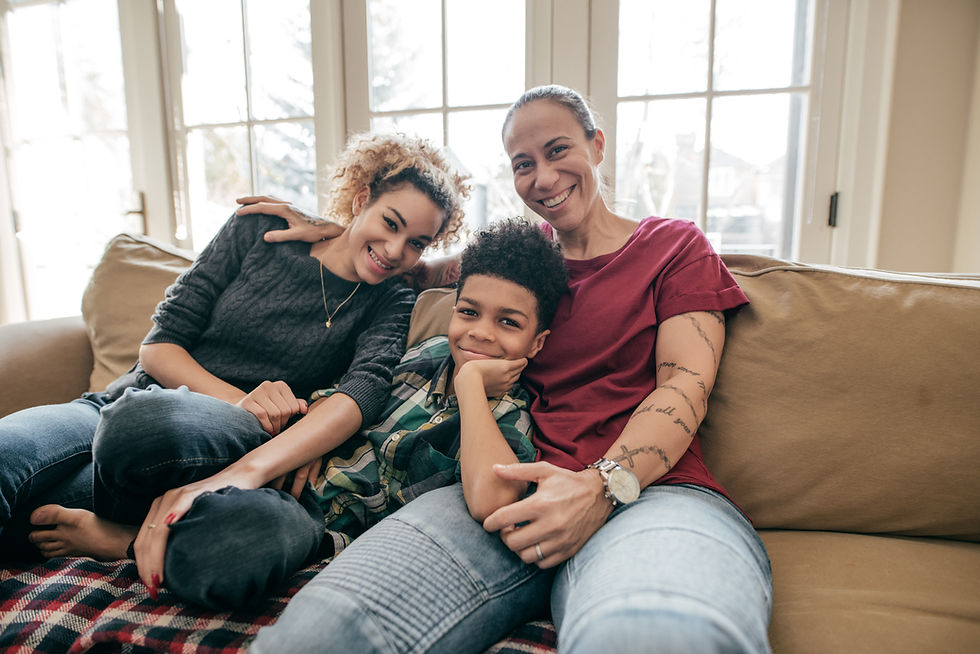Adjunct Family Therapy
- Lillian Farzan-Kashani

- Oct 28, 2025
- 4 min read
Adjunct Family Therapy in Los Angeles, San Diego, and San Francisco

Adjunct Family Therapy
Supporting Individual Growth Within the Family System
Family dynamics can be complex, especially when cultural values, generational expectations, and identity differences intersect. Many multicultural young adults and adults in Los Angeles find themselves trying to balance honoring their family while carving out space for their individuality.
Adjunct family therapy offers a unique path forward: you can do your personal work while your family receives their own support from another therapist. This approach helps each person grow without blurring boundaries or putting one person in the “problem” role.
What Is Adjunct Family Therapy?
Adjunct family therapy means that you and your family members work with separate therapists who communicate collaboratively (with your consent). Rather than everyone sharing one therapist, each person can have space to process their own emotions, perspectives, and histories.
For example:
You might see an individual therapist to explore identity, boundaries, and emotional regulation.
Meanwhile, your parents or siblings work with a family therapist to learn new ways to communicate, repair ruptures, or navigate cultural and generational gaps.
When the therapists coordinate, the entire family system benefits from greater understanding and alignment—without losing the safety and focus of individual work.
Why Families in Los Angeles Choose This Approach
In a city as diverse as LA, families often carry layered cultural narratives—immigration stories, interfaith relationships, multilingual homes, and evolving gender and sexuality norms. Adjunct family therapy can be especially helpful for:
First- and second-generation families navigating differences in communication and values
Adult children balancing independence and familial expectations
Parents trying to connect across cultural or generational divides
Interfaith or multicultural families learning to honor everyone’s traditions
Families experiencing conflict or disconnection while respecting each person’s pace
In traditional family therapy, everyone meets together with one therapist. This can be powerful, but it’s not always the right fit, especially if emotions are high or there’s a risk of someone feeling silenced.
Individual space: Each person can process feelings privately.
Collaborative care: Therapists can align goals and share relevant insights (with permission).
Safety and accountability: Each therapist supports their client while maintaining focus on relational growth.
As a multicultural therapist in Los Angeles, I specialize in working with individuals who are part of families engaged in couples or family therapy. My focus is helping clients:
Strengthen their sense of self while staying connected to loved ones
Understand their emotional patterns within the family system
Communicate boundaries with compassion and clarity
Process from intergenerational and cultural stressors
I do not see families as a unit—but I work thoughtfully in collaboration with other clinicians to support the whole system’s health.
Getting Started
If you or your family are currently in family therapy, adjunct individual work can deepen your overall progress. You don’t have to choose between focusing on yourself or your family–you can do both in an integrated, respectful way.
If you’re based in Los Angeles, San Diego, San Francisco, or anywhere in California, and this approach resonates with you, I invite you to reach out. We can discuss how adjunct family therapy might fit into your personal growth journey.
FAQ
1. What is adjunct family therapy?
Adjunct family therapy is when family members work with different therapists who collaborate to support the family as a whole. For example, you might see an individual therapist while your parents or siblings work with a family therapist. This approach allows everyone to process their emotions in a safe space while still promoting collective growth and understanding.
2. How is adjunct family therapy different from regular family therapy?
In regular family therapy, everyone meets together with one therapist. Adjunct therapy offers a more flexible approach—each person has their own therapist, creating room for individual reflection and privacy. The therapists can coordinate (with your consent) to ensure everyone is supported and aligned toward shared goals.
3. Who is adjunct family therapy best suited for?
Adjunct therapy is a great fit for multicultural and intergenerational families, adult children of immigrants, or families where communication feels strained. It helps when emotions are high or when some members need individual support before or during joint sessions. It’s especially helpful for families navigating cultural, generational, or identity-related differences.
4. Can I start adjunct family therapy if my family isn’t in therapy yet?
Yes. You can begin individual therapy focused on family dynamics, and your therapist can help you decide if involving another family therapist might be beneficial later on. Many clients start this way to strengthen their boundaries, self-awareness, and communication before introducing joint work.
5. Do the therapists communicate with each other?
Only with your permission. Collaboration between therapists can help ensure that everyone’s progress is supported holistically, but your confidentiality always comes first. You choose what information is shared.
6. How do I know if adjunct family therapy is right for me?
If you’re feeling stuck in family patterns but want to do your own processing while maintaining family ties, adjunct therapy may be a good fit. It’s ideal for individuals who want both personal growth and stronger relationships, without being pulled into family sessions before they’re ready.
7. Do you offer online sessions for clients outside Los Angeles?
Yes. I offer online therapy for clients across California, so even if you’re outside of Los Angeles, you can still benefit from adjunct individual therapy that complements your family’s work with another clinician.
8. What cultural or family issues do you specialize in?
I specialize in working with multicultural Californians, including first- and second-generation individuals, kids of immigrants, and those in interfaith or cross-cultural families. Common themes include identity, communication, boundaries, intergenerational expectations, and processing cultural or relational trauma.



Comments